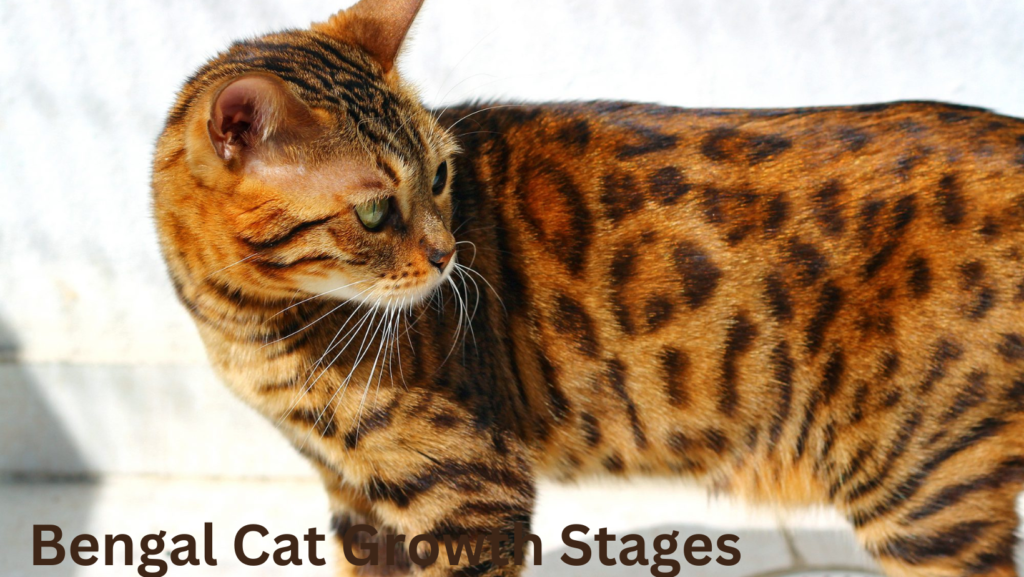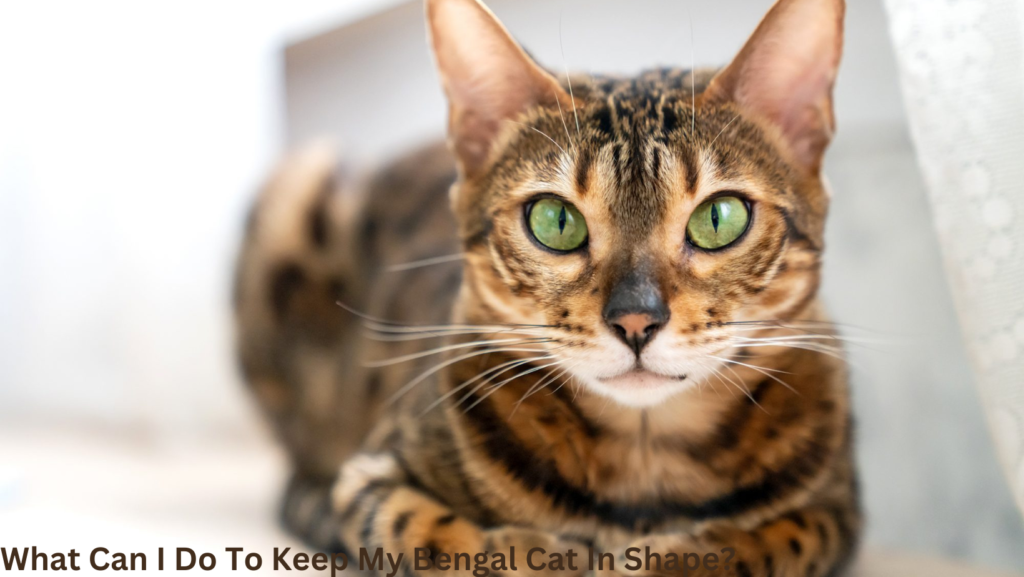Bengal cats are renowned for their striking appearance, playful personalities, and energetic demeanor. With their stunning coat resembling that of a wild leopard, these feline companions are truly a sight to behold. However, as a proud Bengal cat owner, you may find yourself questioning whether your pet is maintaining a healthy weight.
If you’ve noticed that your Bengal is a bit on the heavier side, it’s essential to dive into the world of feline health and nutrition. Understanding the underlying factors that contribute to weight gain in cats, specifically in the uniquely active Bengal breed, is crucial for their well-being.

In this blog post, we’ll explore potential reasons why your Bengal cat might be gaining excess weight, the implications of being overweight, and practical steps you can take to ensure your furry friend remains fit and healthy. Let’s get started on the journey toward a happier, healthier Bengal!
Why Is My Bengal Cat Heavy?
If you’ve noticed that your Bengal cat is heavier than you’d like, it’s important to understand the factors that might contribute to their weight gain. Bengal cats are known for their athleticism and playful nature, but there can be several underlying reasons for excess weight in this breed. Let’s explore the most common causes and what you can do about it.
1. Diet and Nutrition
One of the primary reasons for weight gain in Bengal cats is their diet. If your cat is consuming more calories than they are burning, it can lead to obesity. Here are a few dietary considerations:
- High-Calorie Foods: If you’re feeding them high-calorie treats or tables scraps, it could be excessive. Selecting high-quality cat food that meets their nutritional needs is essential.
- Free-Feeding: Allowing your cat to graze on food throughout the day can lead to overeating. Instead, opt for scheduled feeding times.
- Lack of Fresh Water: Sometimes, cats may confuse thirst with hunger. Ensure your Bengal always has access to fresh water, which may help control their appetite.
2. Decreased Activity Levels
Bengal cats have a high energy level, but various factors may limit their physical activity:
- Indoor Lifestyle: If your Bengal is primarily kept indoors, they may not have enough opportunities to exercise. Create a stimulating environment with climbing structures, interactive toys, and regular playtime to encourage activity.
- Age: As cats age, their activity levels may naturally decrease. Older Bengals may not have the same enthusiasm for play as they did when they were younger, necessitating adjustments in their diet and exercise routine.
- Health Issues: Sometimes, underlying health problems can affect your cat’s energy levels. Conditions such as hypothyroidism or arthritis can lead to decreased activity, contributing to weight gain.
3. Genetics
While diet and lifestyle are significant factors, genetics also play a role in your Bengal’s weight. Some cats may be predisposed to gain weight regardless of their eating and exercise habits.
If you suspect genetic factors are at play, consult with your veterinarian to discuss your cat’s specific needs and health strategies.
4. Neutering/Spaying
Neutering or spaying your Bengal can change their metabolism. After these procedures, many cats require fewer calories. Not accounting for this reduction can potentially lead to weight gain. It’s essential to adjust their diet accordingly after these surgeries.
Implications of Being Overweight
An overweight Bengal cat may be at risk for several health issues, including diabetes, joint problems, and heart disease. Maintaining a healthy weight is crucial for their overall well-being, and managing their diet and exercise can prevent these complications.
What to Do If Your Bengal Is Overweight
- Consult with a Veterinarian: A vet can help assess your cat’s weight, run necessary tests, and create a tailored nutrition and exercise plan.
- Adjust Diet: Switch to a portion-controlled, high-quality diet that meets their nutritional requirements without overloading on calories.
- Increase Activity: Engage your Bengal in regular playtime and provide opportunities for them to explore and exercise.
- Monitor Progress: Keep track of their weight and body condition. Regular vet visits can help ensure they’re on the right track.
There are a few reasons why my Bengal cat is heavy and so fat. One reason is that he doesn’t get much exercise because he’s indoor-only. Another reason is that he loves to eat and is always begging for food.
I try to give him healthy food, but he’s always begging for more, so he probably eats more than he should. Lastly, Bengal cats are naturally stocky cats, so he may just be a big boy. Whatever the reason, he’s a big, beautiful cat and I love him just the way he is.
What Can I Do To Keep My Bengal Cat In Shape?
There are a few things you can do to help keep your Bengal cat in shape.
First, make sure they have plenty of space to run and play. A Bengal cat that is cooped up inside all the time is more likely to become overweight and lazy.
Secondly, feed them a high-quality diet that is rich in protein and low in carbohydrates. This will help them maintain their lean muscle mass and stay energetic.
Finally, provide them with lots of toys and playtime to keep them active and engaged. By following these simple tips, you can help your Bengal cat stay healthy and fit for life.
Bengal Cat Growth Stages
The Bengal cat is a relatively new breed that has only been around since the 1970s. However, in that short time, they have become one of the most popular cat breeds in the world. Part of their appeal is their unique appearance, which is the result of crossbreeding domestic cats with Asian leopard cats.

Bengal cats reach full size at around 3-4 years of age. However, they are still considered to be kittens until they are around 1 year old. After that, they are known as adults. Bengals are typically larger than other domestic cat breeds, with males typically weighing around 15-20 pounds and females around 10-15 pounds.
Despite their size, the Bengals are actually quite agile and athletic. They love to play and are very active, which is one of the things that makes them such great pets. If you are considering getting a Bengal cat, be prepared for a lifetime of fun and games!
The Best Diet For Your Growing Bengal
As your Bengal kitten grows into adulthood, their dietary needs will change. While they are still growing, they will need a diet that is high in protein and calories to support their growth. Once they are adults, they will need a diet that is lower in calories and fat to help them maintain a healthy weight.

Bengal cats are also known to be prone to diabetes, so it is important to feed them a diet that is low in sugar and carbohydrates. Talk to your veterinarian about the best diet for your growing Bengal and make sure to monitor their weight and health closely.
How can My Bengal Lose Weight?
If your Bengal is overweight, there are a few things you can do to help them lose weight. First, cut back on their food intake. You can do this by measuring their food and giving them smaller portions. You should also make sure they are getting enough exercise. A good way to do this is to take them for walks or runs twice a day.

Finally, avoid giving them high-calorie treats. Instead, opt for healthy options like fruits or vegetables. By following these tips, you can help your Bengals lose weight and improve their overall health.
Do Bengal Cats Get Fat?
Yes, Bengal cats can get fat if they are not exercised enough and are fed too much. Bengals are very active cats and need a lot of space to run and play. They also need a lot of toys and puzzles to keep them mentally stimulated. If they are not given enough of these things, they can become bored and start to put on weight.

Are Fat Bengal Cats Unhealthy?
There is no definitive answer to this question, as there is no definitive answer when it comes to the health of any cat, regardless of breed. However, some experts believe that fat Bengal cats may be more prone to health problems than cats of other breeds.
This is because Bengals are typically very active cats, and when they are overweight, it can put a strain on their bodies and lead to health issues such as diabetes and joint problems.
If you have a Bengal cat that is overweight, it is important to talk to your veterinarian about the best way to help them slim down. There are a variety of different weight loss plans that can be tailored to your cat’s individual needs, and your vet will be able to help you create a plan that will help them safely lose weight and improve their overall health.

What to do if your Bengal Cat is Fat?
If your Bengal cat is fat, there are a few things you can do to help them slim down. First, cut back on their food portion sizes and make sure they are eating a healthy diet.
You can also increase their activity level by playing with them more often or taking them for walks. Finally, consult with your veterinarian to see if there are any underlying health issues that may be causing your Bengal cat to be overweight.
Read More:
Final Thoughts
Understanding why your Bengal cat may be carrying extra weight is crucial for their long-term health and happiness. By recognizing the factors contributing to weight gain—such as underlying health issues, genetics, and changes in metabolism after spaying or neutering—you can take a proactive approach to their care.
Remember, a combination of a balanced diet, regular exercise, and veterinary support will help your feline friend maintain a healthy weight and reduce the risk of associated health problems. Your attention to their needs can make all the difference in ensuring they lead a vibrant and active life. Give your Bengal the best chance at wellness, and cherish the joy they bring to your home!

